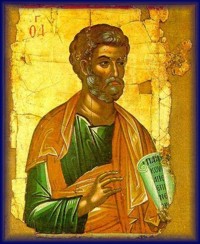|
Spot the real Peter… and Paul
This is awful. This is terrible. My faith has just been overturned; I've been cut loose from the anchor and am adrift without a life jacket. The cause of this despair, you ask? I have just discovered that the Bible is actually full of lies. (Well, the New Testament, anyway.) (Well, some of the epistles, anyway.) This I know, for Bart Ehrman tells me so. He assures us that scholars assure us that "there is no way on God's green earth" that 2 Peter was written by Peter, for example, and that Paul could not possibly have authored six of the letters attributed to him. Nobody but "fundamentalists" (whatever negative spin he may intend to convey by that dirty word) are led astray by the claim in 2 Peter that Peter wrote it. After all, 2 Peter contains some stylistic variations from 1 Peter, so they could not possibly have both been written by the same person, could they?! And since Clement of Alexandria, writing in the middle of the second century, gives credence to the idea that the genuine article, Peter, wrote 1 Peter, while nobody we know of gives Peter credit for writing 2 Peter until Origen did about fifty years later, it stands to reason that 2 Peter was penned by a charlatan. Ditto for six of Paul's books. Give us a break.
Although the term "pseudigrapha", meaning "writing that is inscribed with a lie", has long been used by scholars in reference to Jewish writings excluded from both the Old Testament canon and the Apocrypha, the term is now applied, almost de rigueur, to those New Testament letters allegedly written by someone other than the named authors. The idea is that some faker wanted to get credibility for his own ideas and so tried to palm off his writings as the creation of the real deal. Don't misunderstand. Undoubtedly that sort of thing went on back then, but one would hope for more compelling evidence than the scholars give that whoever wrote about "the word of truth" and the importance of "speaking truth" in the epistle to the Ephesians was in fact a big fat fibber.
What objective criteria are used by scholars to damn the likes of 2 Peter and 1 Timothy to forger's hell? None. It's all so, so, so subjective. Let the "fundamentalist" commentator on the book of 2 Peter in the New Geneva Study Bible apprise us of the yardstick used. (He must be a fundamentalist, or maybe a university dropout who inveigled himself into the good graces of the selection committee: he concludes that, "The case against Peter's authorship is. not proved, and the epistle's own claim to have been written by Peter can be taken at face value".) As he explains, the more common criteria for consigning a letter to literary disgrace are "the lack of early attestation, slow recognition by the church, stylistic differences. and (in the case of 2 Peter) the apparent use of Hellenistic religious and philosophical language". Some scholars even detect a literary
|
dependence in Peter's second letter on the epistle of Jude. (Never mind that Jude's epistle only has 25 verses in it.) The good old "Encyclopedia of Religion and Ethics" edited by Hastings, written between 1908 and 1927, sums up the arguments used against claimed authorship as consisting of two main classes: "(1) literary and, (2) those which rest upon the supposed background of ideas and of ecclesiastical development suggested by the writings in question". Modern critics have added little of substance to the old arguments.
Look, we could go on and on about every one of these points, but we won't. You don't have to be a scholar to recognize that each of these would fail abysmally as evidence in a court of law. Late attestation (the letter doesn't crack a mention in contemporary works), for instance, means nothing. So nobody mentioned it early on. One wonders if every one of Shakespeare's plays is mentioned by contemporary writings that have survived till our time. Even if they were, let's remember that Shakespeare died over 170 years after Gutenberg invented the printing press while the New Testament authors died thirteen hundred years before. Who can say how many writings from the first and second centuries have never seen the light of day?
Using differences in style as a means of validating or invalidating unity of authorship (the literary class) is fraught with frailties. True, we all tend to use certain words and expressions more frequently than others, but to confidently claim that two works must have been written by different authors because they varied in style and vocabulary betrays a certain degree of intellectual dishonesty. Everybody's style and vocabulary would vary in lockstep with their topic, with their purpose for writing and with their audience. In his first epistle, Peter was writing to fellow Jews (1:1) while the second was to "those who have obtained like precious faith with us", which included both Jews and Gentiles. Not surprisingly, based on this fact alone, themes and emphasis varied between the two. No surprise, then, that 2 Peter employs "Hellenistic religious and philosophical language".
Don't let Ehrman's bullying style intimidate you. Many others who would agree with his basic contention are far less dogmatic in their conclusions. For instance, James Aageson studied what he called "theological patterns" (the second class mentioned earlier) in Paul, and concluded that the Pastoral Epistles of Paul were "most likely written after Paul's death",1 a far cry from Ehrman's "take no prisoners" approach. Concerning this second general approach, Hastings has this to say,
When we turn to the arguments of the other class, they fail to carry conviction to minds which are not prepossessed with the conception that none of these writings can be Apostolic.2
Hear, hear. God gave you a brain. All you have to do is use it to recognize that the forceful assertions of some are but houses built on sand.
|





